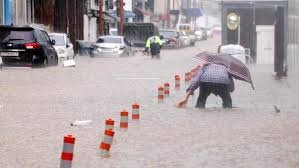
It is five minutes before the curtains close on one of the biggest events that brought together corporates, business, and industry leaders.
Amidst the bustling activity of the event’s conclusion, Krishna Unni meticulously straightens the red carpet on the walkway, ensuring every detail is perfect. He is the Group General Manager of Sankara Nairobi Autograph Collection by Marriott.
Having delivered the opening address with fervor and passion, it is clear that Unni is determined to leave a lasting sustainability impression in Kenya, symbolizing his unwavering commitment to welcoming corporate and business executives into a new era of sustainable hospitality and business.
The event is the “Safe for People, Safe for Nature” initiative launch, a collaboration between the World Wide Fund for Nature-Kenya (WWF-Kenya) and Sankara Nairobi.
This initiative aims to bring together businesses to catalyze private sector partnerships for environmental sustainability and climate action, as well as to lobby and spur investments in community-led climate action.
Speaking during the launch, Unni noted, “Our initial collaboration started five years ago when we signed an agreement with them and launched a program called ‘Herd of One’.
Essentially, what that program was is we encouraged guests who stayed with us (Sankara) to donate One US Dollar per stay, and that money was given to WWF-Kenya, which they used for their elephant conservation program. Like I always say, the true heroes are the people on the ground.”
Sentiments echoed by Mohamed Awer, CEO of WWF-Kenya, “we will deliver on this vision with five goals, which are to support thriving wildlife in this country, to contribute to the quality and quantity of habitat for wildlife and to help people benefit from natural resources. Where businesses, like most of you, come in is to minimize the impact of production and consumption by minimizing our footprint. And finally, to work on the whole issue of governance, which is natural resource governance, policy, legislation, and related issues.”
The Safe for People, Safe for Nature platform seeks to respond to the triple crisis of the planet: climate change, pollution, and biodiversity loss.
“We call it ‘caring for our roots,’ and that essentially means we care for this great place we call home, planet Earth,” added Unni.
Climate adaptation and mitigation in relation to sustainable businesses was also discussed, emphasizing the crucial link between environmental stewardship and corporate responsibility.

“Promote transformational planning and programming by pushing for integrated strategies that maximize the benefits between mitigation, adaptation, and sustainable development. Secondly, catalyze climate innovation by investing in new technologies, business models, and practices, and by so doing, develop and establish proof of concepts,” highlighted Rosalind Gichuru, Group Director Marketing and Communication at Kenya Commercial Bank (KCB).
From nature-based solutions and enterprises to community-led innovative climate action initiatives, the business leaders had an opportunity to not only showcase what works but to commit to investing in the latest technological trends to enhance conservation.
“So the technology I want to talk about today is called Twiga. It is an AI-powered solution that has been developed with experts in technology and conservation biology from Vodafone, Safaricom, WWF, and KWS. An early warning and deterrent system to alert communities to the presence of specific wildlife species. The system uses AI to detect and identify a variety of species, and then it triggers interchangeable and species-specific deterrents. So I heard elephants fear bees, so when the elephants move near the communities, then they will hear the sound of bees, and they will be deterred. This M-Twiga is powered using an integrated solar photovoltaic cell with rechargeable battery banks, so it can work anywhere,” Karen Basiye, Director of Sustainable Business and Social Impact at Safaricom.






